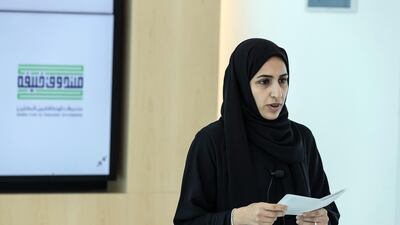The Khalifa Fund for Enterprise Development, an Abu Dhabi government agency that backs small-and-medium enterprises (SMEs), expects businesses to recover to pre-Covid levels by the middle of 2021 as they adapt to changing consumer demand and economies gradually reopen.
New opportunities are emerging to invest in SMEs operating in the healthcare, food processing and agriculture technology sectors that would provide a "good base" to manage through crises, Mouza Al Nasri, acting chief executive of Khalifa Fund, told The National.
"We're now seeing signs of recovery with many businesses going back to operate," Ms Al Nasri said. "However, recovery will take some time, especially [given] that many of these SMEs lost some of their staff and need to recruit, train and market again."
Globally, the Covid-19 pandemic hit small businesses hard as cash flow dried up when movement restrictions to stop its spread kept customers at home. The UAE took swift action by rolling out billions of dirhams in economic stimulus to shore up its private sector, ease SME's access to funds and cushion the impact of the the virus-induced slowdown.
The Dh2 billion Khalifa Fund, which released its annual report on Tuesday, disbursed Dh50.3 million in new loans last year to 79 local SMEs mainly in the services, tourism, food and beverages, manufacturing and technology sectors.
The fund, which typically grants Dh30m to Dh50m in loans on average per annum, expects to disburse a slightly smaller amount this year compared to 2019 as some SMEs put plans on hold due to current market conditions, Ms Al Nasri said.
SMEs received Dh17.5m in the first half of 2020, relatively lower than previous periods, as businesses face hurdles such as difficulties in hiring in the wake of movement restrictions, exporting their offerings or importing supplies, the executive said.
As elsewhere around the world, tourism, hospitality, aviation, entertainment and sports were adversely impacted by the pandemic. However, businesses involved in e-commerce, logistics, e-learning, food supplies, disposable medical supplies, and streaming entertainment have boomed during the crisis, Ms Al Nasri said.
To adapt to the changing needs of its members, the fund has shifted its priorities to focus on helping entrepreneurs cope with the unprecedented coronavirus crisis by offering workshops and access to consultants.
"We started to think that instead of just funding or standing still, we need to tweak the business models of these SMEs," Ms Al Nasri said.
Depending on their sector and commercial activity, the fund advised some SMEs to transition to a digital business model, offering their services online and finding new ways to generate revenue to continue operations.
"We became like doctors for SMEs," she quipped. "They needed help at this difficult time."
To boost SME's cash flow and help them survive the crisis, the fund offered various relief measures. These include three-month deferrals on loan payments, restructuring loans to reduce instalments and re-allocating loan money for more urgent purposes such as paying wages. The fund also negotiated with landlords on the entrepreneurs' behalf to get reduced rent payments.
Ms Al Nasri, who became acting chief executive in 2019 after a 12-year tenure at the fund, said it is currently "too early" to estimate the survival rate among its SME members.
"The year was hectic and the impact was sudden for many sectors," she said. "We need to assess and evaluate a case study for the future."
In May, the fund released a 56-page report assessing the impact of the Covid-19 crisis on the UAE's SMEs sector based on its own primary research conducted in April.
It found that tourism, entertainment and recreation, education, retail, and food and beverage sectors took the biggest hit from the coronavirus pandemic in terms of sales.
However, it also found the crisis generated opportunities for remote work, boosted consumer appetite for online shopping, opened demand for mass production of personal protection equipment and increased investment in food security.
The UAE's SME landscape is set to change due to the Covid-19 pandemic, affected by changes in consumer behaviour and how businesses operate, Ms Al Nasri said.
"Consumers will still be cautious socially and economically," she said. "SMEs will not manage operations liked they used to before."
Among projects in the pipeline for 2020, the Khalifa Fund is planning a revamp of its membership programme. It is working with various government bodies and stakeholders to offer SMEs more support such as fee waivers, professional consulting, training and growth programmes for franchising and exporting.
The agency is also developing an SME rating system to review the overall performance of businesses, helping them to be listed for procurement programmes, Ms Al Nasri said.
The agency is working with the government on a study to determine the priority sectors for Abu Dhabi. It will then decide which commercial activities the fund will support, Ms Al Nasri said. The study is still being finalised.
The Covid era is expected to give way to new start-ups with ideas that respond to changing consumer needs.
"Many new ideas that cater to this situation will pop up," she said. "The amount of investment will be lower, people will think about how to do more with less and the business models will be more agile."
Since its establishment in 2007, the fund has supported 1,170 projects with a total of Dh1.32 billion in loans. Its projects have created 15,000 jobs in the private sector, of which 1,800 were for Emiratis.
In 2019, it received 1,530 new applications, increasing the total amount to 30,000 since its inception.


